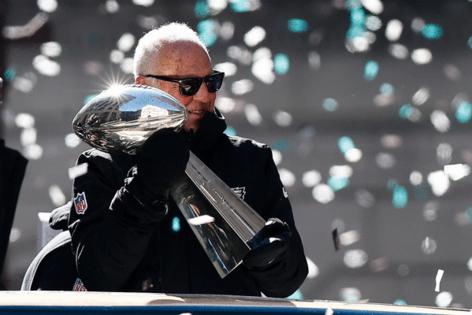Mike Sielski: Jeffrey Lurie and the Eagles want a new stadium. Cool. They can pay for it.
Published in Football
PHILADELPHIA — Hot as it was Thursday morning at the NovaCare Complex, the sight of the Eagles holding a training-camp practice at their own headquarters, with select fans and sponsors ringing the fields, with a Rita’s Italian Ice truck dishing out cups of mango and green apple, would have been a welcome vision for Jeffrey Lurie.
When Lurie bought the Eagles in 1994, they still held their summer camp in the dormitories and on the gravelly fields of West Chester University, then retired for the regular season to the unfriendly and rat-ridden confines of Veterans Stadium. The team’s fans may have appreciated the Vet’s spartan conditions, and they may not have minded the drive up the Northeast Extension for each of the 17 summers the Eagles trained at Lehigh University. But Lurie couldn’t wait to get out of the Vet and into the franchise’s own stadium and practice facility. So he and the Eagles have Lincoln Financial Field and NovaCare, and with the team’s two Super Bowl victories and its rise to the NFL’s uppermost tier of clubs, those days on the dusty hills in Bethlehem and inside a concrete doughnut in South Philly seem like distant history.
Now Lurie is looking to go further. The Eagles in recent weeks have been gauging interest in a new stadium, one with a dome so that the place could host a Super Bowl, a Final Four or something similar. Lurie has wanted the Linc to be a destination for those sorts of events for years, and a more modern, weatherproof coliseum would put Philadelphia in the mix for them.
A new stadium would deliver the added benefits of an improved fan experience for those who could afford to attend Eagles games and those national events — and a more lucrative experience for Lurie and the rest of ownership. It might draw tourists and visitors to the city. The plans could be aligned with those that Harris/Blitzer and Comcast Spectacor have for the 76ers’ and Flyers’ new arena and the South Philly sports complex.
It sounds nice.
So it’s pretty simple.
If the Eagles want a new stadium, they should build it.
And if the Eagles want a new stadium, they should pay for it.
Not the city’s taxpayers. Not the state’s taxpayers. In a perfect world, the public wouldn’t put a dime into such a project. In the real world, there are just two NFL stadiums — MetLife Stadium in North Jersey and SoFi Stadium in Inglewood, Calif. — that were built exclusively with private funding, and each of them houses two franchises. But that landscape is merely a reflection of how many cities fall prey to the boondoggle of public stadium financing, of the argument from the owners and leaders of these franchises that the projects are investments. And if you don’t want to invest your money in this manner, then maybe the owner of your favorite team will just relocate the franchise to a town with people who do.
In fairness to the Eagles, Lincoln Financial Field’s funding was a 50/50 split between public and private, and the Eagles have paid for all the upgrades and renovations to the stadium in the years since its opening in 2003. But the fact remains the evidence that municipalities derive much economic benefit from building stadiums and arenas is scant at best and nonexistent at worst. The latest example is roughly 140 miles to the south, where the city council of Washington, D.C., is about to rubber-stamp a $3.7 billion deal to fund a new stadium for Josh Harris and the Commanders on D.C.’s RFK Campus.
As economist Neil DeMause noted, a study by the council’s budget office examined mixed-use development — i.e. building homes, apartments, retail outlets — for the site. The study compared two scenarios: mixed-use development at RFK with a stadium, and mixed-use development without one. Guess what? The non-stadium scenario was projected to bring in more tax revenue. Guess what else? They’re going to build the stadium anyway.
Philadelphia is a different matter altogether. Gov. Josh Shapiro has acknowledged this reality, having said that he did not support using state money to fund the Sixers’ proposed arena at 10th and Market, and there’s no reason yet to think that he would change his mind for Lurie and the Eagles. Besides, at least the D.C. region’s pols and residents have an excuse. At least they’re swept up in the euphoria of having a competitive team again, of having a great young quarterback in Jayden Daniels, and of not having Daniel Snyder. Plus, Northwest Stadium is indeed a dump — and not just a dump, but an inaccessible dump.
But there has been no public clamoring around here to replace the Linc, and neither Lurie nor anyone else can make the case that having a 22-year-old outdoor stadium in a Northeast city has hampered the Eagles’ efforts to become an elite team. The Vet was an albatross. The Linc is the home of the best team in the NFL. If Jeffrey Lurie wants to try to make things even better for the Eagles and their fans, no one has to stop him. But no one has to try to help him, either.
©2025 The Philadelphia Inquirer. Visit inquirer.com. Distributed by Tribune Content Agency, LLC.







Comments